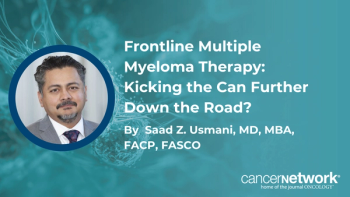
Resilience Important Aspect of Improved QOL for Myeloma
A high level of resilience was associated with a better mental and physical health-related quality of life among patients with multiple myeloma.
A high level of resilience-or a person’s ability to adapt to adversity-was associated with a better mental and physical health-related quality of life (HRQOL) among patients with multiple myeloma and its precursor diseases, according to the results of a study
Early stages of multiple myeloma are usually asymptomatic, but survivors of myeloma often deal with a wide variety of mental and physical impairments due to the disease itself or its treatments. In addition, research has
With this study, Imad Maatouk, MD, of Medical University Hospital Heidelberg, Germany, and colleagues investigated if there was a relationship between resilience and mental and physical HRQOL.
“In the current scientific discussion, resilience is described as a multidimensional construct that encompasses both relatively stable personality traits and a state that is triggered by adverse events such as undergoing a treatment for cancer,” the researchers wrote.
In this single-center study, the researchers included 292 consecutive patients from the myeloma outpatient department. Patients could have a diagnosis of multiple myeloma, smoldering myeloma, or monoclonal gammopathy of undetermined significance. The patients completed questionnaires on HRQOL, depression, and psychological resilience.
About one-third of patients had active myeloma (33.6%), one-third had already been treated for myeloma (36.3%), and one-third (30.1%) had a precursor disorder. After testing for resilience, more than half of patients (57.3%) were classified as having a high level of resilience. About one in five patients had moderate to severe depressive symptoms.
“As expected, we found inverse association between psychological burden and resilience and positive relations with HRQOL,” Maatouk told Cancer Network.
Specifically, a multivariate linear regression analysis showed a strong positive association between resilience and physical (P < .001) and mental (P < .001) HRQOL. Those patients with higher levels of resilience had a lower risk for high depression severity compared with patients with a low level of resilience (P < .001).
“The concept of resilience is promising for its potential application in interventional research in order to support patients with myeloma and its precursors to cope with the situation,” Maatouk said.
“Further studies on quality of life and psychological burden in multiple myeloma should be carried out to understand the correlations,” Maatouk said. “In particular, the preliminary stages of multiple myeloma should be considered. In a further step, intervention approaches can be developed and evaluated. Promoting resilience is promising for its potential to support patients.”
Newsletter
Stay up to date on recent advances in the multidisciplinary approach to cancer.






































